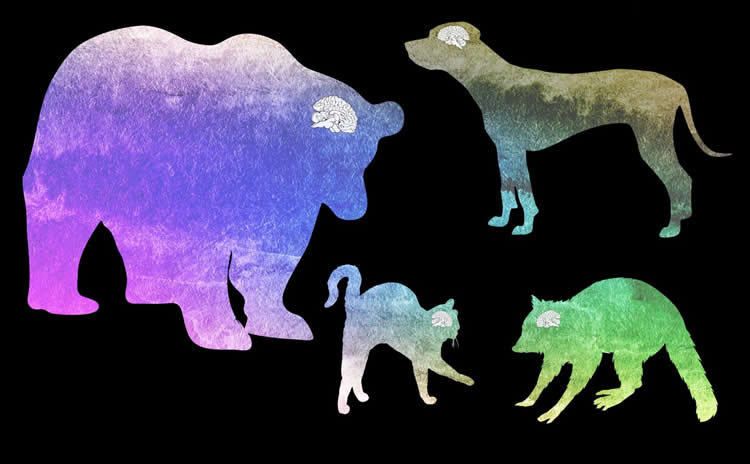Summary: Dogs possess significantly more cortical neurons than cats, a new study reports.
Source: Vanderbilt University.
There’s a new twist to the perennial argument about which is smarter, cats or dogs.
It has to do with their brains, specifically the number of neurons in their cerebral cortex: the “little gray cells” associated with thinking, planning and complex behavior –all considered hallmarks of intelligence.
The first study to actually count the number of cortical neurons in the brains of a number of carnivores, including cats and dogs, has found that dogs possess significantly more of them than cats.
“In this study, we were interested in comparing different species of carnivorans to see how the numbers of neurons in their brains relate to the size of their brains, including a few favorite species including cats and dogs, lions and brown bears,” said Associate Professor of Psychology and Biological Sciences Suzana Herculano-Houzel, who developed the method for accurately measuring the number of neurons in brains.
(Carnivora is a diverse order that consists of 280 species of mammals all of which have teeth and claws that allow them to eat other animals.)
The results of the study are described in a paper titled “Dogs have the most neurons, though not the largest brain: Trade-off between body mass and number of neurons in the cerebral cortex of large carnivoran species” accepted for publication in the open access journal Frontiers in Neuroanatomy.
As far as dogs and cats go, the study found that dogs have about 530 million cortical neurons while cats have about 250 million. (That compares to 16 billion in the human brain.)
“I believe the absolute number of neurons an animal has, especially in the cerebral cortex, determines the richness of their internal mental state and their ability to predict what is about to happen in their environment based on past experience,” Herculano-Houzel explained.
“I’m 100 percent a dog person,” she added, “but, with that disclaimer, our findings mean to me that dogs have the biological capability of doing much more complex and flexible things with their lives than cats can. At the least, we now have some biology that people can factor into their discussions about who’s smarter, cats or dogs.”

Herculano-Houzel and her collaborators–graduate students Débora Messeder and Fernanda Pestana from the Universidade Federal do Rio de Janeiro in Brazil; Professor Kelly Lambert at Randolph-Macon College; Associate Professor Stephen Noctor at the University of California, Davis School of Medicine; Professors Abdulaziz Alagaili and Osama Mohammad from King Saud University in Saudi Arabia; and Research Professor Paul R. Manger at the University of the Witwatersrand in South Africa–picked carnivorans to study because of their diversity and large range of brain sizes as well as the fact that they include both domesticated and wild species.
The researchers analyzed the brains of one or two specimens from each of eight carnivoran species: ferret, mongoose, raccoon, cat, dog, hyena, lion and brown bear.
They expected that their measurements would confirm the intuitive hypothesis that the brains of carnivores should have more cortical neurons than the herbivores they prey upon. That is because hunting is more demanding, cognitively speaking, compared to the herbivore’s primary strategy of finding safety in sheer numbers.
However, that proved not to be the case. The researchers determined that the ratio of neurons to brain size in small- and medium-sized carnivores was about the same as that of herbivores, suggesting that there is just as much evolutionary pressure on the herbivores to develop the brain power to escape from predators as there is on carnivores to catch them.

In fact, for the largest carnivorans the neuron-to-brain-size ratio is actually lower. They found that the brain of a golden retriever has more neurons than a hyena, lion or brown bear, even though the bigger predators have brains up to three times as large. The bear is an extreme example. Its brain is 10 times larger than a cat’s, but has about the same number of neurons.
“Meat eating is largely considered a problem-solver in terms of energy, but, in retrospect, it is clear that carnivory must impose a delicate balance between how much brain and body a species can afford,” said Herculano-Houzel.
Hunting requires a lot of energy, particularly for large predators, and the intervals between successful kills are unpredictable. That explains why large meat-eating carnivorans like lions spend most of their time resting and sleeping. In terms of energy, the brain is the most expensive organ in the body and its requirements are proportional to the number of neurons. It also needs energy continuously. As a consequence, the quantity of meat that large hunters can kill and consume and the intermittent nature of feeding appears to limit their brain development.
The study’s findings also challenge the prevailing view that domesticated animals have smaller brains than their wild cousins. The ratios of brain size to body weight of the domestic species they analyzed–ferret, cat and dog–did not scale in a significantly different manner from those of their wild relatives–mongoose, raccoon, hyena, lion and brown bear.
The analysis also discovered that the raccoon was an outlier–on the brainy side: It packs the same number of cortical neurons as a dog into a brain the size of a cat’s.
“Raccoons are not your typical carnivoran,” said Herculano-Houzel. “They have a fairly small brain but they have as many neurons as you would expect to find in a primate … and that’s a lot of neurons.”
According to the neuroscientist, studying the brains of different species teaches an important lesson: “Diversity is enormous. Not every species is made the same way. Yes, there are recognizable patterns, but there are multiple ways that nature has found of putting brains together–and we’re trying to figure out what difference that makes.”
Funding: The study was funded by the James S. McDonnell Foundation; the Schapiro Undergraduate Research Fund at Randolph-Macon College; the Vice Deanship of Research Chairs at the King Saud University; the National Research Foundation of South Africa; and Brazilian crowdfunding contributors.
Source: David F Salisbury – Vanderbilt University
Publisher: Organized by NeuroscienceNews.com.
Image Source: NeuroscienceNews.com image is credited to Jeremy Teaford, Vanderbilt University.
Video Source: Video credited to Vanderbilt University.
Original Research: Abstract for “Dogs have the most neurons, though not the largest brain: Trade-off between body mass and number of neurons in the cerebral cortex of large carnivoran species” by Débora J. Alvarenga, Kelly Lambert, Stephen C. Noctor, Fernanda Pestana, Mads F. Bertelsen, Paul Manger and Suzana Herculano-Houzel in Frontiers in Neuroanatomy. Published online November 27 2017 doi:10.3389/fnana.2017.00118
[cbtabs][cbtab title=”MLA”]Vanderbilt University “Sorry Grumpy Cat, Study Finds Dogs Are Brainier Than Cats.” NeuroscienceNews. NeuroscienceNews, 29 November 2017.
<https://neurosciencenews.com/dog-cat-intelligence-8059/>.[/cbtab][cbtab title=”APA”]Vanderbilt University (2017, November 29). Sorry Grumpy Cat, Study Finds Dogs Are Brainier Than Cats. NeuroscienceNews. Retrieved November 29, 2017 from https://neurosciencenews.com/dog-cat-intelligence-8059/[/cbtab][cbtab title=”Chicago”]Vanderbilt University “Sorry Grumpy Cat, Study Finds Dogs Are Brainier Than Cats.” https://neurosciencenews.com/dog-cat-intelligence-8059/ (accessed November 29, 2017).[/cbtab][/cbtabs]
Abstract
Dogs have the most neurons, though not the largest brain: Trade-off between body mass and number of neurons in the cerebral cortex of large carnivoran species
Carnivorans are a diverse group of mammals that includes carnivorous, omnivorous and herbivorous, domesticated and wild species, with a large range of brain sizes. Carnivory is one of several factors expected to be cognitively demanding for carnivorans due to a requirement to outsmart larger prey. On the other hand, large carnivoran species have high hunting costs and unreliable feeding patterns, which, given the high metabolic cost of brain neurons, might put them at risk of metabolic constraints regarding how many brain neurons they can afford, especially in the cerebral cortex. For a given cortical size, do carnivoran species have more cortical neurons than the herbivorous species they prey upon? We find they do not; carnivorans (cat, mongoose, dog, hyena, lion) share with non-primates, including artiodactyls (the typical prey of large carnivorans), roughly the same relationship between cortical mass and number of neurons, which suggests that carnivorans are subject to the same evolutionary scaling rules as other non-primate clades. However, there are a few important exceptions. Carnivorans stand out in that the usual relationship between larger body, larger cortical mass and larger number of cortical neurons only applies to small and medium-sized species, and not beyond dogs: we find that the golden retriever dog has more cortical neurons than the striped hyena, African lion and even brown bear, even though the latter species have up to 3 times larger cortices than dogs. Remarkably, the brown bear cerebral cortex, the largest examined, only has as many neurons as the ten times smaller cat cerebral cortex, although it does have the expected ten times as many non-neuronal cells in the cerebral cortex compared to the cat. We also find that raccoons have dog-like numbers of neurons in their cat-sized brain, which makes them comparable to primates in neuronal density. Comparison of domestic and wild species suggests that the neuronal composition of carnivoran brains is not affected by domestication. Instead, large carnivorans appear to be particularly vulnerable to metabolic constraints that impose a trade-off between body size and number of cortical neurons.
“Dogs have the most neurons, though not the largest brain: Trade-off between body mass and number of neurons in the cerebral cortex of large carnivoran species” by Débora J. Alvarenga, Kelly Lambert, Stephen C. Noctor, Fernanda Pestana, Mads F. Bertelsen, Paul Manger and Suzana Herculano-Houzel in Frontiers in Neuroanatomy. Published online November 27 2017 doi:10.3389/fnana.2017.00118






